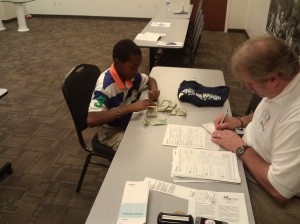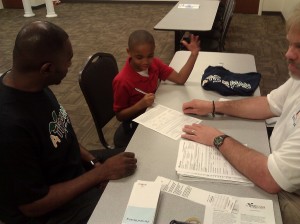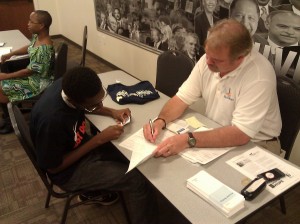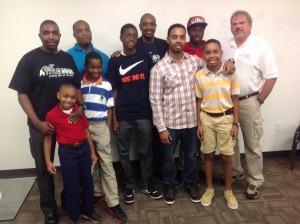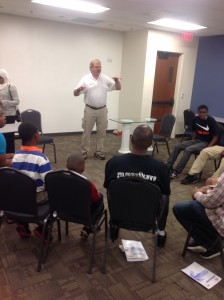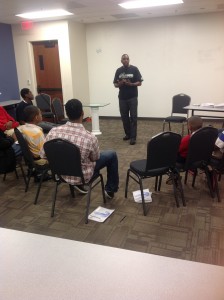Obesity is a problem in this country that is getting worse. One-third of our children have an elevated risk of serious health 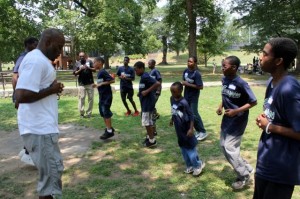 problems because of their weight. Our nation’s leading experts agree that we must change our schools and communities to help children eat healthy foods and get more exercise.
problems because of their weight. Our nation’s leading experts agree that we must change our schools and communities to help children eat healthy foods and get more exercise.
Why is it important to focus on schools? Because kids spend about seven hours a day there.
Although there’s much work to be done, schools have made progress in recent years. Since 2006, they’ve started to offer healthier foods and beverages – like fresh fruit, whole grains and low-fat milk – with school lunch meals. They’ve also cut back on some of the less healthy foods, like cookies, pastries and salty snacks. But they haven’t made any progress in the amount of physical education (PE) or recess offered to elementary students during this same time period.
Here’s what we know:
• Children aged six to 17 should get at least one hour of daily physical activity, yet less than half of kids aged six to 11 get that much exercise. And as kids get older, they’re even less active.
• The National Association of Sport and Physical Education (NASPE) recommends that elementary school students get an average of 50 minutes of activity each school day – at least 150 minutes of PE per week and 20 minutes of daily recess.
• Kids who are more active perform better academically.
As a researcher and a parent, I’m very interested in improving our understanding of how school policies and practices impact kids’ opportunities to be active at school. My colleagues and I recently conducted a study to examine the impact of state laws and school district policies on PE and recess in public elementary schools across the country.
During the 2006 to 2007 and 2008 to 2009 school years, we received surveys from 1,761 school principals in 47 states. We found:
• On average, less than one in five schools offered 150 minutes of PE per week.
• Schools in states with policies that encouraged daily recess were more likely to offer third grade students the recommended 20 minutes of recess daily.
• Schools serving more children at highest risk for obesity (i.e. black and Latino children and those from lower-income families) were less likely to have daily recess than were schools serving predominantly white students and higher-income students.
• Schools that offered 150 minutes of weekly PE were less likely also to offer 20 minutes of daily recess, and vice versa. This suggests that schools are substituting one opportunity for another instead of providing the recommended amount of both.
• Schools with a longer day were more likely to meet the national recommendations for both PE and recess.
So what does this mean?
We need strong state laws and district policies for PE and recess to help more of our youngest students meet the national recommendations for physical activity.
What can be done?
First, Congress should consider making PE a core requirement of the Elementary and Secondary Education Act. This would help ensure that all students get adequate amounts of exercise and that PE classes follow evidence-based guidelines and are taught by certified teachers.
Second, states should adopt and/or strengthen their PE and recess policies so they align with the national recommendations.
Third, school districts should continue to strengthen their policies by requiring time for PE and recess that aligns with the national recommendations.
Finally, given competing time demands and other issues schools face, increasing the amount of time for physical activity during the school day may be challenging. That’s why it’s critical for schools to help kids make the most of the time they do have for physical activity. Schools can do this by increasing the amount of time kids spend in moderate-to-vigorous activity during PE, recess and brief classroom breaks (you can find some resources here and here) and by offering intramural sports and physical activity clubs before or after school.
Sandy Slater, PhD, is a Research Assistant Professor of Health Policy and Administration at the University of Illinois at Chicago School of Public Health, and is the lead author of the study “The Impact of State Laws and District Policies on Physical Education and Recess Practices in a Nationally Representative Sample of U.S. Public Elementary Schools,” published in the Archives of Pediatrics and Adolescent Medicine.
 We expect more exciting things for 2014. Our last event of the year is our “Annual Bike for Life” event where we find the pleasure of delivering bikes to underprivileged children on Christmas morning. What a joy and pleasure it is to see the excitement and smiles on the face of these grateful individuals as our team members and volunteers deliver the unexpected gift.
We expect more exciting things for 2014. Our last event of the year is our “Annual Bike for Life” event where we find the pleasure of delivering bikes to underprivileged children on Christmas morning. What a joy and pleasure it is to see the excitement and smiles on the face of these grateful individuals as our team members and volunteers deliver the unexpected gift.






